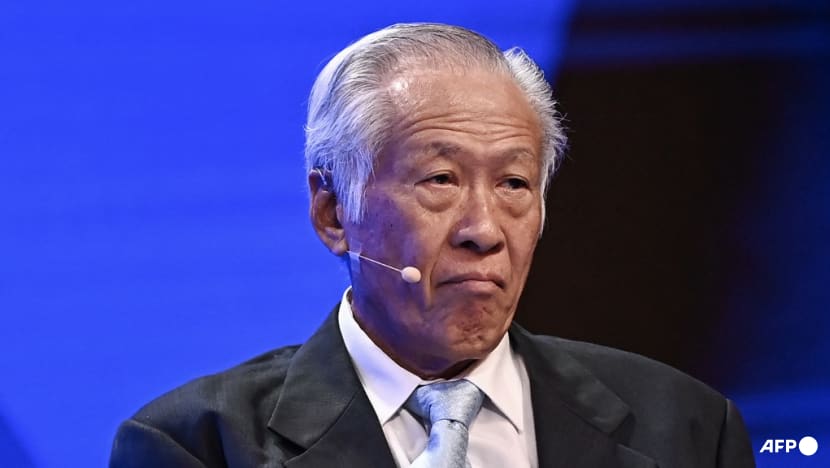US and China don't need a third party to help with problems in relationship: Ng Eng Hen
Singapore's defence minister addressed questions from reporters on the third and final day of the Shangri-La Dialogue.

Singapore Defence Minister Ng Eng Hen attends the 21st Shangri-La Dialogue summit at the Shangri-La Hotel in Singapore on Jun 2, 2024. (Photo: AFP/Nhac Nguyen)

This audio is generated by an AI tool.
SINGAPORE: The United States and China do not need a third party to help with the problems in their relationship and will instead need to deal with issues "squarely by themselves", said Singapore’s Defence Minister Ng Eng Hen on Sunday (Jun 2).
Addressing questions from reporters on the third and final day of the Shangri-La Dialogue, Asia's top defence summit, Dr Ng said he hopes such forums will continue to encourage both the US and China.
Reiterating comments he made to the media on Saturday after a ministerial roundtable, Dr Ng said only the US and China can deal with the problems between them.
"They don't need a third party and I doubt a third party would help. They need to deal with this squarely by themselves," he added.
Dr Ng also pointed to remarks made by US President Joe Biden on how he wants "competition" with China and "not conflict".
"If they can achieve that, then I think the overall system is stable," Dr Ng told reporters.
He highlighted that the differences between the two nations will last "quite long", pointing to the fundamental difference in their political systems. The US is a democracy while China is ruled by the Communist Party.
"There are bound to be differences. It's not going to go away overnight. So, we have to find some level of accommodation, some level of progress despite the differences over the next few decades.”
Dr Ng added that he does not think a small country can balance big powers. While it may be an aspiration to hope for, the country would be "put to the test" if these powers exert pressure.
"Our approach is really to convince the powers to be, whether they're big, middle or otherwise, that it is to their collective interest to have a system that protects the rights of large and small powers ... and to be inclusive to avoid military alliances (and) trade blocs," said the defence minister.
LEARNING THE WESTERN STYLE
Dr Ng also shared his observations on how Chinese representatives have learnt and adapted to how Western forums and dialogues are conducted.
Speaking about his experience attending the Beijing Xiangshan Forum last October - which has been styled as China's answer to the Shangri-La Dialogue in Singapore - the minister said: "Things are a bit more scripted. Questions sometimes tend to be a bit more polite. They don't sometimes ask what they really want to ask."
On the other hand, Western-based meetings tend to be "full on" and questions are supposed to be asked in public.
But Dr Ng said the Chinese representatives have learned the Western style of approach, which he called a good development.
He gave an example of how representatives from China’s People's Liberation Army arranged a meeting with the media shortly after Philippine President Marcos’s keynote speech on Friday to share their views.
"I think that's very healthy. In other words, this is called the Socratic discourse; never avoiding questions ... even if the questions are uncomfortable," he said.
"That is a better way than not asking the question. Because when you don't ask the question, it's not as if the problem will solve itself."
US-CHINA IMPACT ON ASIA
Dr Ng also gave a speech earlier on Sunday during the final plenary session of the Shangri-La Dialogue on reimagining solutions for global peace and regional stability.
The defence minister acknowledged that what leaders from the US and China say "count a great deal".
"Most of us here would agree that the US and China are dominant protagonists to decide Asia’s fate for this decade and beyond," he said, adding that both countries have disavowed physical conflict between them.
Despite reassuring affirmations from both sides, "temperatures did go up" on topics involving Taiwan’s independence and the South China Sea.
Still, the meeting between President Biden and Chinese President Xi Jinping in San Francisco last November proved a positive step to "calm troubled waters, if not build back relations", added Dr Ng.
He also noted that another meeting between the two is "unlikely" with the upcoming US Presidential elections this year and that expectations of increasing engagement are low on both sides.
"Notwithstanding this political ennui, more dialogue and positive initiatives are sorely needed," said Singapore’s defence minister.
On Sunday, Dr Ng was also asked if Singapore will be attending the upcoming peace conference in Switzerland. Ukrainian President Volodymyr Zelenskyy had earlier urged world leaders to show their support amid the country's war with Russia.
Mr Zelenskyy, who is in Singapore for the Shangri-La Dialogue, said in an address and question-and-answer session during the conference that 106 countries and organisations had signed on for the peace summit.
He also noted that it was disappointing that some world leaders had not yet offered their support.
In response to the question, Dr Ng said he “(doesn’t) see a reason not to” attend the summit but that it is up to Singapore’s Ministry of Foreign Affairs and the Prime Minister to make the decision.




















